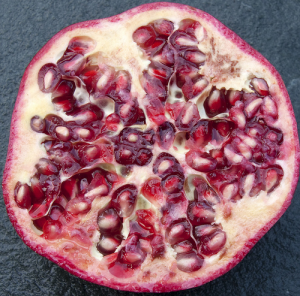 Growing between five to eight meters in height, a pomegranate is a fruit bearing and tiny tree with deciduous like shrub features. This delicious fruit is native and found mostly in Iran and the Himalayas highlands between North India and Northern Pakistan. Today, it is popularly cultivated in India, Iran, Iraq, China, Azerbaijan, Burma, Afghanistan, Israel, Egypt, Saudi Arabia, Vietnam, Thailand, Laos and Cambodia with lesser cultivation in tropical Africa, the Mediterranean and Southern Europe.
Growing between five to eight meters in height, a pomegranate is a fruit bearing and tiny tree with deciduous like shrub features. This delicious fruit is native and found mostly in Iran and the Himalayas highlands between North India and Northern Pakistan. Today, it is popularly cultivated in India, Iran, Iraq, China, Azerbaijan, Burma, Afghanistan, Israel, Egypt, Saudi Arabia, Vietnam, Thailand, Laos and Cambodia with lesser cultivation in tropical Africa, the Mediterranean and Southern Europe.
The Pomegranate becomes ripe when you start noticing its distinctive color and when tapped it makes a metallic clinging sound. The fruits should be picked days before maturity when they start showing signs of cracking open. It almost has the same shelf and storage life as the apple and is best maintained at a room temperature of 41 degree Fahrenheit to 32 degree Fahrenheit for a period of 6 to 7 months. It improves its taste and becomes more flavorful and juicier as time goes by.
This fruit produces 16% of vitamin C requirements of adults per 100ml serving of daily nutrients allowance making it one of the healthiest fruits in the world. Pomegranate is also rich in polyphenols and potassium, Vitamin B5, flavonoids, tannins and fiber.
The high fiber content of Pomegranates however, is found in the edible seeds which can also supply unsaturated oils. People who neglect the seeds end up forfeiting its additional nutritional value through its oils, seed fiber and other micronutrients.
Health benefits of this sweet fruit include reducing the risk of heart diseases, heart attacks and strokes. According to a study published in the American Journal of Clinical Nutrition, medical researchers stated an example of an experiment conducted for two weeks on a group of healthy grown up men and dozens of unhealthy mice. Both groups drank Pomegranate juice everyday for two weeks. The result found out that the adult men experienced a large increase in their antioxidant levels, which translates to a drop of ninety percent in their LDL cholesterol oxidation. The mice also turned up a result of 90% drop in their LDL oxidation of peritoneal macrophages.
The juice that the Pomegranates produced also helps alleviate viral infection and produces antibacterial compounds to battle against dental bacteria and plaque. It was also proven, that this fruit helps reduce the systolic blood pressure by injecting its serum angiotensin converting enzyme.
Another study by medical experts has shown the huge possibility of Pomegranates by way of its extracts help battle the proliferation of human breast cancer cells. The juice of this fruit is very popular among old people as it also helps in the cleansing of the body system by its antioxidants contents and produces a healthy body system thus lessening the chances of a recurring illness.
The Pomegranate has since become widely commercialized due to its health benefits. There are wine, juice, jellies and salad dressing found in the supermarket shelves nowadays. The popularity of Pomegranate is due to the fact many studies have shown that its high level of antioxidants is beneficial to one’s health in a lot of way.
If you have anything to add to this post, please feel free to Post a comment or share your thoughts through Facebook, Twitter or comment section below to join the conversation.